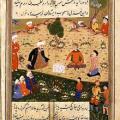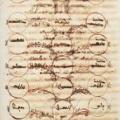179 - Mohammed Rustom on Philosophical Sufism
Peter is joined by Mohammed Rustom in a discussion about Sufi authors including Ibn 'Arabī, al-Qūnawī, and Rūmī.
Themes:
• M. Rustom, “Is Ibn al-'Arabī’s Ontology Pantheistic?” Journal of Islamic Philosophy 2 (2006), 53-67.
• M. Rustom, “Approaches to Proximity and Distance in Early Sufism,” Mystics Quarterly 33 (2007), 1-25.
• M. Rustom, “The Metaphysics of the Heart in the Sufi Doctrine of Rumi.” Studies in Religion 37 (2008), 3-14.
• M. Rustom, The Triumph of Mercy: Philosophy and Scripture in Mullā Ṣadrā (Albany: 2012).
• M. Rustom (ed.), W.C. Chittick, In Search of the Lost Heart: Explorations in Islamic Thought (Albany: 2012).
• M. Rustom, “Ibn 'Arabī’s Letter to Fakhr al-Dīn al-Rāzī: a Study and Translation.” Oxford Journal of Islamic Studies 25 (2014).
Prof. Rustom's webpage with lots of resources on the Islamic intellectual tradition.







Comments
Sound quality again
Just to say that this interview was recorded over Skype so the sound quality is not up to the usual standard on interviews - but it isn't too bad.
In reply to Sound quality again by Peter Adamson
Lofi_Sufi
No worries. I found that playing a lofi backtrack goes perfectly with the compressed audio vibe. I recommend it wholeheartedly :)
The beautiful game
Hi Peter
Sufist philosophy in the premier league
Challenging for the championship of belief
Defended stoutly by al-Quwaui
Inspirational poetical play by Rumi
The beautiful game
Gods essence the frame
Impregnated with divine goals
A cosmic shape with interchangeable roles
Abd al-Qadir al-Jaza'iri?
First, the fan mail: I've been a keen listener since Plotinus, and I've enjoyed it all (in fact, having something good to listen to is the only thing that's brought me back to the gym, albeit intermittently).
Here's my question: after hearing you discuss Ibn Arabi's legacy with Professor Rustom, I was wondering if you had any plans to discuss Abd al-Qadir al-Jaza'iri (a.k.a. Emir Abdelkader) when the time comes. He's someone who engaged creatively with Ibn Arabi's ideas, and his life encapsulates a lot of the history of his period (he fought the French, ended up in late Ottoman Damascus, and posthumously became a nationalist icon).
In reply to Abd al-Qadir al-Jaza'iri? by Denis McAuley
Abd al-Qahir
That's an interesting suggestion, thanks! I don't know if I will squeeze him in because the 19th c episode is a bit crowded (I wanted to get in later developments in the Ottoman realm, Iran and India). I'll see if I can fit him though.
Mathematicians and Platonism.
I found this interview particularly fascinating, as I think that the way Dr Rustom described Ibn Arabi's approach to the Names of God as being very much the same as Mathematicians approach Mathematical objects.
Mathematicians often get the rough end of the stick. For example Leon Horsten writes in his article of the Philosophy of Mathematics in the Stanford Encyclopaedia of Philosophy (http://stanford.library.usyd.edu.au/entries/philosophy-mathematics/):
I think the confusion comes due to the following types of exchanges between a Philosopher (P) and a Mathematician (M) - yes, it is a simplification and probably a little unfair to Philosophers.
P: So, are Mathematical objects just social conventions?
M: Umm, No.
P: So thinks like numbers are real?
M: Yes.
P: Can you show me one, like the number "three".
M: No - it is an abstract concept.
P: So it isn't material.
M: Correct.
P: It must be therefore an ideal form.
M: Sort of... (shuffles feet)
P: You are therefore a Platonist!!
M: If you say so
However, many Mathematicians (including myself) are Mathematical Realists, without being Platonists. Mathematicians do not consider Mathematical objects, such as number of Geometric figures, as having an ontological existence such as giraffes or Buster Keaton movies, but having an existance as relationships.
So I found Dr Rustom's explanation particularly useful.
In reply to Mathematicians and Platonism. by Bernard Colbert
Mathematical objects
Thanks, that's a very interesting and unexpected connection. I agree that the forced choice between full-blown Godel style realism and conceptualism is a false dichotomy that is often forced, not just on mathematicians, but on people who want to believe in other abstract objects (minds, universals, etc). Can you say a bit more about your solution though? I mean, if mathematical objects, like numbers, are relations, what are the relata? Like, if the number 4 is a relation, then it is a relation between two other things X and Y: what are X and Y?
In reply to Mathematical objects by Peter Adamson
Number
Yes - I agree that anyone postulating abstract objects has the same difficulty. I consider that the Mathematical objects I work with are real: and I am in the fortunate position of having some of thme realised in the form of ciphers.
The question you pose about the relationship of numbers to each other is probably the most difficult of questions to answer. My initial thoughts concerned geometric objects such as triangles and circles. These are essentially descriptions of relationships - and then by focussing on the relationship at an abstract level one can derive true statements about those relationships. Most Mathematical statements are of the form: If x then y.
As for number - the Mathematician Leopold Kronecker (1823-1891 see: http://www-groups.dcs.st-and.ac.uk/history/Biographies/Kronecker.html for biography) said "God created the integers, all else is the work of man."; the integers being whole numbers greater than 0.
There a several ways in which numbers can be thought of, and contructed. However, contructing them ex nihilo is a little difficult.
The Intuitionism of Brouwer asserts that all Mathematical objects are constructions - the the integer 4 has as relationship to the prior construction. This leads to a reduction to the first object, which is usually unity or 1. This approach, however, recognises that real Mathematicians are finite
In the 20th century, the construction of the integers was also derived from set theory - as is done in Whitehead et al. "Principia Mathematica". In this, one starts the the null set {}, i.e. nothing. Then one has the set of the null set: thus, one associated the set of the null set with the number 1 - since it has one element. Then a set can be constructed of the null set and the set of the null set, which has 2 elements. This is associated with the number 2. This process can be repeated for all the integers. In this case, 4 stands in relation to 3 as being derived from 3, and 5 as producing 5 in the next step.
Even in Ancient Greece there is something of this type of construction. Numbers were represented by lengths, which could be arbitrary: 2 was simply 1 added to itself. Multiplication was the area defined by a rectangle defined by the lengths of the size of the numbers. The Greek Mathematicians were able to develop a rich understanding of numbers.
What these approaches have in common is that the focus on relationships between the numbers: they also all suffer from the problem of starting from nothing, and being a little weak at that point.
I will have to read Ibn 'Arabī to work out if he is able to assist at this point.
In reply to Number by Bernard Colbert
Starting from nothing
Thanks - my philosophy of maths isn't good enough to build on what you're saying, but I would add two thoughts. First, you may like Eriugena, too. He is an early medieval thinker who explicitly says that God's creating things "from nothing (ex nihilo)" means creating them "from Himself" since He is nothing, in the sense of beyond being. We might even get to Eriugena before the end of the year since he'll be early in the medieval episodes.
Second, I like your point that math is mostly about hypothetical reasoning: if X then Y. I actually think philosophy is like that too, a lot of the time. That is, philosophers think about what would follow if one were to make a certain assertion: what objections could arise, or what else might follow from it? So for instance what are the implications (or costs and benefits) of a certain view of free will, say, or for that matter of the status of numbers.
Chinese connection
I found the part about Chinese attempts to explain Ibn 'Arabi with the help of Confucianism fascinating. Prof. Rustom spoke about how it's only very recently that work has been done on this. Where might some of this work have been published?
In reply to Chinese connection by Chike Jeffers
Re: Chinese connection
Dear Chike,
The first place to look would be Sachiko Murata's "Chinese Gleams of Sufi Light", as well as "The Sage Learning of Liu Zhi: Islamic Thought in Confucian Terms" by Murata, William Chittick, and Tu Weiming.
"Rectifying God's Name: Liu Zhi's Confucian Translation of Monotheism and Islamic Law" by James Frankel is also a very useful study.
For the wider historical and cultural context, see "The Dao of Muhammad: A Cultural History of Muslims in Late Imperial China" by Zvi Ben-Dor Benite.
Kristian Petersen's website gives access to his articles on Chinese Sufism, and also includes information about his fascinating forthcoming books on the topic: http://drkristianpetersen.com/
It is interesting to note that it was not only the school of Ibn 'Arabi that played an important role in Chinese-language Islam. Sunni rational theology was also made available in Chinese. In "The Sage Learning of Liu Zhi", the authors demonstrate how important the fourteenth-century Ash'arite theologian 'Adud al-Din Iji's "al-Mawaqif fi 'ilm al-kalam" was for Chinese Muslim scholars, particularly the seventeenth-century author Liu Zhi. Liu calls Iji's book "Gezhi quanjing" ("The Complete Classic of Investigating and Extending"), and draws on Iji's discussions on cosmology quite a bit.
(Incidentally, select English translations from Iji's "Mawaqif", along with translations from Sayyid Sharif Jurjani's commentary upon this text, can be found in volume 3 of "An Anthology of Philosophy in Persia", edited by Seyyed Hossein Nasr and Mehdi Aminrazavi).
Hope these leads help.
Mohammed
In reply to Re: Chinese connection by Mohammed Rustom
Thanks very much!
I greatly appreciate the references.
Relational Names?
If the Divine Names are relational, then what are they a relationship between? From what I've read of Ibn Arabi, I'm thinking the answer is something like "non-being" and "God." Would that be accurate, or am I misunderstanding something here?
Also, if the divine names are manifest in the cosmos, then it seems that Arabi has a radically relational and transient view towards the created universe, something akin to the Buddhist Sunyata or modern process theology. Everything is changing and flowing relationship, rather than static ontological entities, formed out of the different possible relationships between Absolute Being and Absolute Nonbeing. Am I reading this correctly or not?
In reply to Relational Names? by James Ryman Bierly
Re: Relational Names
Hello Ryan,
The divine names obtain their relational status by virtue of God’s manifest “face” as it “looks toward” the fixed entities. Insofar as the fixed entities (which are nothing other than the quiddities in philosophical parlance) are “nonexistent” (think of the various debates on the status of quiddities), yes, the divine names are relationships between God and non-being. But, Ibn ‘Arabi (and his followers) insist that the fixed entities do have some kind of reality as they are nothing other than God’s objects of knowledge whose status of fixity in God’s “mind” never change, whether they are brought into concrete existence or not. When they are brought into concrete existence, divine names obtain. That is, the divine names are relationships between God qua manifestation and the objects of His knowledge qua concretization. This is explained in greater detail in my article, “Philosophical Sufism” in “The Routledge Companion to Islamic Philosophy” edited by Richard Taylor and Luis Xavier López-Farjeat.
Yes, it can be said that Ibn ‘Arabi has a radically relational and transient view towards the cosmos. But, the point to keep in mind, as he makes very clear, is that the divine names, although not ontological entities as such, are “real” insofar as their traces and effects are found throughout the cosmic order (which his everywhere, and in everything). Look at, say, a person who is called “sister,” “daughter,” and “teacher” all at the same time. These different names of hers obtain in accordance with the different people with whom she is associated (i.e., sibling, parent, and student respectively). Nobody would say that the name “sister” insofar as she has a sibling is an untrue or unreal designation. It is a name that comes about as a purely relational thing, but that name also designates a concrete fact and reality vis-à-vis this person’s association with her sibling.
With respect to the change and flow of things in the cosmic picture, indeed Ibn ‘Arabi does have a rather transient view of things from one perspective. But things get immediately complicated when we throw into the equation his views concerning (1) the “fixity” of the fixed entities in the cosmic order and (2) the renewal of creation at each instant (Chittick’s “The Sufi Path of Knowledge” is the best single book to consult for copious texts from Ibn ‘Arabi’s writings on both of these points). The thinker who is commonly associated with the flow-like nature of reality is Mulla Sadra, who was heavily influenced by Ibn ‘Arabi and his followers, but who ultimately presents a unique perspective on this and many other issues, in keeping with his ontology of the primacy of being.
Qaysari
Hi Peter,
in this episode at some point the name Qaysari was mentioned apparently “Davod Qaysari” who has written a commentary on Ibn-Arabi’s Ringstones of Wisdom. Just in the spirit of without any gaps, are there any more info on him?
In reply to Qaysari by Xaratustra
Re: Qaysari
Hi there!
Yes, Dawud al-Qaysari was a major commentator upon Ibn 'Arabi's "Ringstones of Wisdom," and his introduction to this commentary has always been a major teaching text in Iran. There are some useful materials on Qaysari out there (both published and forthcoming). Here are some of them in no particular order:
1. A forthcoming introduction to his thought by Muhammad Faruque as part of the Islamic Texts Society's Scholars and Sages of Islam series: "Dawud al-Qaysari: The Mystery of Existence."
2. An entire translation and Arabic edition of the aforementioned introduction by Qaysari forthcoming by Mukhtar Ali (with Brill, I believe). It is a useful work, with a most helpful introduction and commentary.
3. An article on Qaysari here: http://www.mohammedrustom.com/wp-content/uploads/2013/05/Dawud-al-Qaysa…
4. Caner Dagli's groundbreaking book "Ibn al-'Arabi and Islamic Intellectual Culture", which gives good coverage to Qaysari and the main figures in the school of Ibn 'Arabi.
5. A useful book on him in French by Mehmet Bayrakdar, "La philosophie mystique chez Dawud de Kayseri" (Ankara, 1990).
Ibn Arabi a Pomo?
I'm interested by this point that Rustom makes about Ibn Arabi being viewed of as sort of a post-modernist It made me think back once of this American man, the son of a humanities professor, who ended up travelling across North Africa with traditional Muslim scholars. In an interview in the 90s he described Islam as "radically post-modern". Obviously, Ibn Arabi was, and is, a colossal figure especially for the old Muslim literati, and he remains influential in traditional circles in North Africa. That multiple people may have potentially arrived at simmilar conclusions seemingly independently might at to the validity of such a comparison. But exactly what, apart from frustratingly difficult prose, makes Ibn Arabi a post-modernist? Who are these scholars who claim Ibn Arabi as a postmodernist? And what are the similarities between Ibn Arabi's themes and the work of 'post-modernists'? It doesn't help that trying to define post-modernism is like trying to nail jelly to a wall, it's become a pop slur for nearly every 'continental' philosopher and virtually all of the big names associated with it reject the label. So what do we even mean when we say that Ibn Arabi is a 'proto-post-modernist'?
In reply to Ibn Arabi a Pomo? by Paul
Proto-post-modernist
Now that's a good question. I think when you add my knowledge of postmodern thought to my knowledge of Ibn ʿArabī the result may not be enough to give you a good answer, but perhaps it is because he has the idea that reality is a play of signifiers or of language, i.e. the divine names?
In reply to Proto-post-modernist by Peter Adamson
Ibn 'Arabi and Post-Modernism
Dear colleagues,
Thought I would weigh in on the question of Ibn 'Arabi and postmodernism. Ibn 'Arabi should NOT be considered a postmodernist, and this for a number of reasons. The main one is that he believes in an objective truth, and proceeds on these grounds in all of his inquiries. With respect to the divine names, for Ibn 'Arabi they are relational and thus not ontological realities as such. At the same time, Ibn 'Arabi maintains that their effects are real, and describes the cosmos as nothing but traces of the divine names. When it comes to Ibn 'Arabi's hermeneutics, he has a wide-ranging view of scripture and legal theory, but is also very clear on the objective "rules" for engagement with both. For his hermeneutics, see the unparalleled study by Michel Chodkiewicz, "An Ocean Without Shore."
Some attempts have been made to reconcile Ibn 'Arabi with postmodernism. The most noteworthy attempt in this regard is Ian Almond's "Sufism and Deconstruction," which is a study of Ibn 'Arabi and Derrida. Although there are some great merits to this work, there are also fundamental problems in the author's interpretation of Ibn 'Arabi (both with respect to his Arabic prose and his ideas proper). One strong rebuttal to Almond's findings is by Atif Khalil, which is to be published in an upcoming issue of "Sacred Web."
Hope this helps!
Mohammed
Add new comment